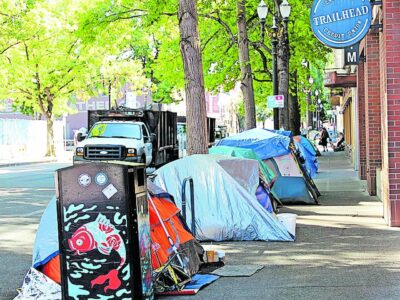The following is an excerpt of a conversation between Rosanne Haggerty, CEO of Community Solutions, and Denver Frederick, Host of The Business of Giving. Listen to the full podcast below.
Denver: Well, this is such a vulnerable population – lacking stable shelter, access to proper hygiene, basic food supplies. Tell us what are you seeing out there now among the homeless?
Rosanne: Well, as you pointed out, this is an extraordinarily vulnerable population – men and women, families who can’t do the basic things that we know we all need to be doing now, which is to quarantine ourselves and to be mindful of washing, and to limit the distance of our contact with others. When you combine that with the underlying health problems that many individuals experiencing homelessness endure, this is a group of people who require urgent attention. And what we’re seeing is that in many communities, they have not even been taken into account by emergency management responses.
In this most recent two-week period, my colleagues and I have been in touch with probably about a hundred communities around what they’re facing, and it’s very consistent that this lack of clarity about who’s in charge of seeing that people experiencing homelessness are taken care of and brought to safety, that workers engaged in that work have the necessary guidance and equipment to do their work safely, and that the need to get people inside as opposed to simply come up with some other kind of emergency response really needs to kind of move on to the forefront.
So those are the basic issues: lack of clarity of response and responsibility, support for the workforce in dealing with a very volatile situation, and just getting people inside.
Denver: Let me ask you about the nonprofit organizations that serve the homeless. They have to be stretched to the bone. I was reading about Miriam’s Kitchen the other day in Washington, D.C., and we know this is a very expensive crisis, and they’re already in a financial crunch. Give us a little idea of what they’re experiencing at the moment.
Rosanne: My two last calls today – one was about Atlanta, and one was about Hartford, Connecticut. And just again, there is this really wonderful network of local leaders who are trying to support each other, and I’m very proud of my colleagues for being at the nexus of many of these conversations.
But for instance, in Atlanta, there’s probably a need for 1,500 isolation areas so that that percentage of the homeless are connected with a place where they are not in a congregate situation. Now, there are hotels and other places that could be available, but when you look at the staffing, the cost of keeping people inside, responding to their needs so they’re not likely to go or require hospital care, that’s millions of dollars if we’re looking at a couple of months until we hope we’re out of the woods. And in Atlanta, for instance, they’re wondering “How do we bridge that distance until the stimulus funds are available?” So, before we got on the phone, I’m making a list of everyone I know in Atlanta who might be able to help out.
But then I also spoke with Matt Morgan in Hartford, who’s the coordinator of the work across the Hartford region, and they have been frantically trying to move the homeless individuals in shelters with the greatest health vulnerabilities– the elderly, into hotel units. And is talking about negotiating some space in a convent. So, basically, people like Matt are just doing the right thing even before they know where the money is going to come from.
And then secondly, how do you get your workforce? People, like their kids are out of school. They’re ill. So just how to execute this massive undertaking with limited staff, and having that decent protective equipment, and make sure you’re asking people to do this work and not put themselves at risk?
So those are the three worries that are repeated over and over again: standing up the kind of isolation units for people who should not be in congregate situations and should not be on the street, and then finding and equipping the staff to do the work.
Denver: What can listeners do to help, Rosanne?
Rosanne: In your community, the groups working on this issue need your support. Flexible resources to pay for these isolation beds, to help get staff in and bulk up the staff to the extent that they can because these organizations are also not doing their fundraisers or not doing their usual work. So flexible resources. If you’re a hotel operator, a landlord, if you happen to have a convent, let the people who are leading on homelessness in your community know that you can help.
This question about who is in charge, the man to know. Find out if the people working on homelessness in your community have the support that they need from whether it’s the governor, the mayor, the county executive. It really is shocking– the degree to which that is pretty confused in a lot of places, and that’s not just bad for people experiencing homelessness, that’s really bad for you. So demand accountability – Who the heck’s in charge? Who’s making decisions? And are people experiencing homelessness just squarely in the center of what you are taking action on– to see that the most vulnerable are safe?
And then on the other side of this, let’s remember that we are all connected and that beyond that concept, there’s a real practical application of it, which is we need a robust civic and public health infrastructure so we’re not caught flat-footed the next time there’s a problem. We, I think, all sensed how surprised we are that our communities were so ill- equipped to react quickly and have the supplies, the plans, and the leadership capabilities that we need. So let’s commit to not forgetting.




